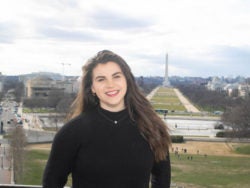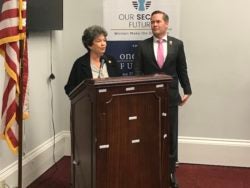This article was originally published on the Georgetown Global Engagement Blog on April 28, 2020.
Just a few weeks ago, the Women, Peace and Security (WPS) Congressional Caucus was launched to promote the meaningful participation of women and the role of gender in international conflicts and conflict resolution within the legislative branch.

I had the opportunity to speak with Hans Hogrefe, the first WPS Congressional Fellow of Our Secure Future, a program of the One Earth Future Foundation, which promoted the creation of the WPS Caucus, about its function and priorities.
The function of a congressional caucus in general is to bring together different members of Congress into a group dedicated to a common legislative topic—rather than to promote specific pieces of legislation. The WPS Caucus, in particular, will create a platform to raise awareness on issues related to WPS priorities and key conflicts, educate the public and members of Congress on WPS policy initiatives, and help coordinate Congressional oversight of the implementation of the WPS National Strategy.
Hogrefe explained that the Caucus came together under the “perfect co-chair combination” of Representative Lois Frankel, a Democrat from Florida’s 21st district and Representative Michael Waltz, a Republican from Florida’s 6th district. Waltz is a freshman congressman who draws on his personal experience in active combat serving as a Green Beret in Afghanistan, which gives him practical experience and knowledge of women’s issues in conflict zones. Congresswoman Frankel, during her time in Congress, has sponsored and advocated for numerous pieces of legislation regarding women, peace, and security. Because the co-chairs are ultimately in control of the direction and priorities of the Caucus, Hogrefe pointed out that “both collectively bring an enormous amount of experience, knowledge and legitimacy to the Caucus” which will help it succeed in a meaningful way.

Specifically, the Caucus will work to follow through on the implementation of the Women, Peace, and Security Act of 2017 to ensure its institutionalization and impact on US foreign policy. Hogrefe described the important role the Caucus plays in alleviating the potential problem of Congress “legislating, and thus buying oversight responsibility in an area with the danger of no Congressional follow-up ” and in ensuring that their legislation is working as intended. Therefore, one of the major goals of the Caucus is to observe and follow through on the WPS Act in order to ensure it meets its original intent. This involves providing a platform for the coordination of the legislative and executive branch, by bringing together members of Congress from different congressional committees with the executive branch to facilitate frank discussions about the role of different committees and agencies in promoting WPS This is particularly important for the topic of WPS because it is such an intersectional issue that impacts almost every other policy issue. Coordination will help ensure that the WPS Act and other atrocities prevention legislation, such as the Elie Wiesel Genocide and Atrocities Prevention Act and the Global Fragility Act work together in a mutually enforcing and beneficial manner.
In the most immediate terms, Hogrefe stated that the current action agenda of the Caucus is to grow membership. He explained that “this is what the caucus is trying to do to continue momentum now that the Caucus has its leadership in place. It is a critical priority to develop the Caucus membership by inviting all members of Congress to formally join because the broader of an audience present, the more effective the Caucus will be , and the more quickly the Caucus will be up and running.”
Overall, the creation of the Congressional Caucus shows the increasing attention given to the perspective of women in conflict and peacebuilding issues. Ambassador Melanne Verveer, the former U.S. Ambassador for Global Women’s Issues and current Executive Director of the Georgetown Institute for Women, Peace, and Security sums it up remarking that “the Congressional WPS Caucus will provide a greater opportunity to spotlight key issues linking women’s agency to peace and security, ongoing peace processes and US leadership, and progress on the implementation of the new US law on Women, Peace and Security. This platform will make it easier for members of Congress and their staffs to stay better informed on these issues and to ensure congressional action when necessary.” Going forward, it will be encouraging to see more members of Congress recognize and advocate for the meaningful inclusion of women through their involvement with the new WPS Caucus.
Grace Shevchenko (SFS’22) is the recipient of the Hoyasforshe Student Fellowship and a student assistant at the Georgetown Institute for Women, Peace and Security.

